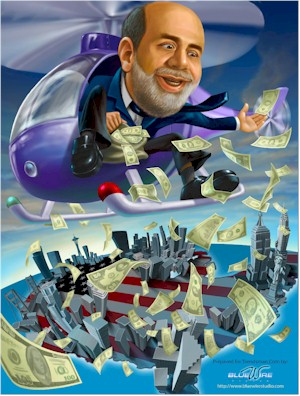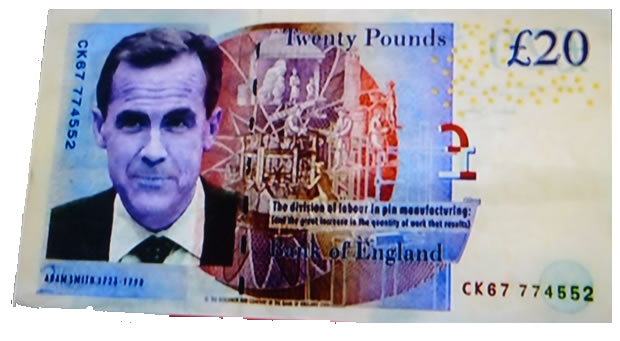Why Loose Money Bernanke Could Learn a Thing or Two From Shrewd Mark Carney
Politics / Central Banks Nov 30, 2012 - 09:19 AM GMTBy: Money_Morning
 Martin Hutchinson writes:
Now that President Barack Obama has been reelected, Federal Reserve Chairman Ben Bernanke's easy money policies may well be with us for the next four years.
Martin Hutchinson writes:
Now that President Barack Obama has been reelected, Federal Reserve Chairman Ben Bernanke's easy money policies may well be with us for the next four years.
And even if Obama replaces Bernanke when his term ends in January 2014, he's likely to choose another soft-money acolyte like Fed Vice-chairman Janet Yellen to lead the Fed.
 For believers in sound money like me, that's something of a gloomy prospect.
For believers in sound money like me, that's something of a gloomy prospect.
As for the rest of the world, the prospects for higher interest rates don't look too good, either.
However, on Monday I did catch a glimmer of light when it was announced the Bank of England's new Governor is going to be Mark Carney, the former head of the Bank of Canada.
Now I'll be the first to admit that, at first glance, Carney doesn't look too promising.
He did, after all, spend 13 years at Goldman Sachs (NYSE: GS). And we all know the track record of Goldman Sachs has been nothing short of appalling.
The bank itself made a bundle by shorting the housing market on the way down and persuaded its alumnus Hank Paulson to bail out its dodgy AIG credit default swaps with $13 billion of taxpayer money.
However, the truth is Carney has been out of Goldman since 2004, and his track record at the Bank of Canada has been very good indeed.
To Carney's credit, he didn't cut interest rates as far as the Fed and has actually raised them part of the way back. What's more, Carney only did $20 billion of "quantitative easing" bond purchases in 2009, at the height of the crisis, and has since sold the extra bonds back to the market.
In the aftermath, Canada's economy has notably outperformed the U.S. economy over the last five years, and continues to do so even though house prices there are currently looking wobbly.
Ben Bernanke could learn a thing or two here.
A Shrewd Central Banker
At the Bank of Canada, Carney has not been responsible for detailed bank regulation, but there's a considerable "nod and a wink" responsibility for the Canadian banking system, which was notably free of the 2008 disasters that afflicted U.S. banks.

Indeed, the Canadian banking system remains much less likely than the U.S. system to take the global economy down with it, since the largest Canadian bank, Royal Bank of Canada (NYSE: RY) has only $757 billion in assets. Compare that with JP Morgan Chase's (NYSE: JPM) $2.3 trillion.
Carney should thus be an improvement on other current central bankers in two respects; he will keep the banking system better under control, and he will follow a less extreme monetary policy.
Current Bank of England Governor Mervyn King has been worse than Bernanke in some respects, funding almost the entire British government's borrowing requirement, even though British inflation has touched 5% and even at today's 2.7% is well above the Bank's nominal target.
For Americans, this may not seem to matter.
After all, Britain's economy is not much bigger than Canada's and only one-sixth the size of the U.S. economic behemoth. As investors, most of us probably have more investments in Canada, which has a very interesting range of mining and energy companies, than we do in the slow-growth economy of Britain.
The difference is not in the pink knee-breeches worn by the Bank of England's doormen, but in the City of London, which remains on some measures the world's largest financial center.
When the world's central bankers meet, the Bank of England Governor is given a place at the top table, along with the President of the European Central Bank and Ben Bernanke.
Is There A Reality Check Ahead?
That gives Carney an outsize influence in his new job.
When Ben Bernanke and Mario Draghi begin to rave about all the exciting bond purchase programs they are inventing, he can remind them of their dangers, and suggest that interest rates above the level of inflation will work better to preserve economic stability.
And when the big banks explain that their new derivatives businesses require them to leverage 1000-to-1 and park the proceeds in the Cayman Islands, he can explain from his Goldman Sachs experience why that isn't a good idea.
At the same time, he can bash any feeble EU attempts to drive the City of London's business to Frankfurt by pointing out that the German banks haven't been so frightfully well managed, either.
So will Bernanke put his head in his hands when confronted by Carney and moan "Oh my God, this has all been a ghastly mistake!" Probably not, but a little injection of reality can't do his policy any harm.
And if even a little of Carney's prudence rubs off on his central banking colleagues (yes, that includes you, Mr. Zero-interest-rate Masaaki Shirakawa, governor of the Bank of Japan) , we should get a modest slowdown in the global tide of funny money - which will benefit us all.
Source :http://moneymorning.com/2012/11/30/why-ben-bernanke-could-learn-a-thing-or-two-from-mark-carney/
Money Morning/The Money Map Report
©2012 Monument Street Publishing. All Rights Reserved. Protected by copyright laws of the United States and international treaties. Any reproduction, copying, or redistribution (electronic or otherwise, including on the world wide web), of content from this website, in whole or in part, is strictly prohibited without the express written permission of Monument Street Publishing. 105 West Monument Street, Baltimore MD 21201, Email: customerservice@moneymorning.com
Disclaimer: Nothing published by Money Morning should be considered personalized investment advice. Although our employees may answer your general customer service questions, they are not licensed under securities laws to address your particular investment situation. No communication by our employees to you should be deemed as personalized investent advice. We expressly forbid our writers from having a financial interest in any security recommended to our readers. All of our employees and agents must wait 24 hours after on-line publication, or after the mailing of printed-only publication prior to following an initial recommendation. Any investments recommended by Money Morning should be made only after consulting with your investment advisor and only after reviewing the prospectus or financial statements of the company.
Money Morning Archive |
© 2005-2022 http://www.MarketOracle.co.uk - The Market Oracle is a FREE Daily Financial Markets Analysis & Forecasting online publication.



